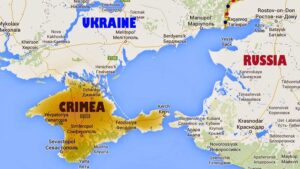Russian President Vladimir Putin orders Military Operation in Eastern Ukraine
Vladimir Putin has ordered a military operation in eastern Ukraine. Putin made the announcement in a televised speech.
Speech Highlights
- Putin warned other countries that any attempt to interfere with the Russian action would lead to “consequences they have never seen.”
- He blamed Ukraine for it and held the Ukrainian regime responsible for the bloodshed.
- He also accused the US and its allies of ignoring Russia’s demand to prevent Ukraine from joining NATO.
- He asked all Ukrainian servicemen to lay down arms and ensured their safe passage from the zone of combat.
- Putin demanded that Ukraine accept Russian sovereignty over Crimea, which Russia annexed in 2014, and renounce its ambition of joining the North Atlantic Treaty Organization.
Ukraine claims a full-scale invasion by Russia
Russia has launched a full-scale invasion of Ukraine and is targeting cities with weapons strikes, Foreign Minister Dmytro Kuleba said in a tweet.
Ukraine reported rocket attacks on military facilities throughout Ukraine and that Russian troops had landed in the southern port cities of Odessa and Mariupol. Residents also reported hearing of artillery fire in the city’s eastern suburbs.
Explosions were heard before dawn in Ukraine’s capital Kyiv and the eastern port city of Mariupol, shortly after Russia’s President Vladimir Putin announced an operation to “demilitarise” the country.
Cyber Warfare. Ukraine earlier had reported that her banks and government ministry websites were hit by a cyber-attack, and it blamed Russia for it.
Russia claims that separatists have asked for help against Ukraine
According to Russia, Separatist leaders in eastern Ukraine have appealed to Russian President Vladimir Putin for help in repelling the military aggression of the Kyiv regime.
Ukrainian President Volodymyr Zelenskiy has said that Putin had not responded to a request to speak by phone. He said Ukraine posed no threat to Russia but would defend itself if attacked.
Clash of the Titans
President Joe Biden has called the move “an unprovoked and unjustified attack by Russian military forces”. He accused Russia of choosing a premeditated war that will bring a catastrophic loss of life and human suffering, He held Russia responsible for the death and destruction this attack would bring. He declared that the US and its allies and partners will respond in a united and decisive way.
Market in a Turmoil
Markets have taken a hit after these developments. Oil prices have soared past $100 for the first time in more than seven years. Russian military operations have resulted in carnage on Dalal Street. Stocks are bleeding in the red and investors have lost up to Rs 10 lakh crore in market value. Stocks also fell across Asia, with equities declining in Australia, Japan, and South Korea.
Effect on India
The crude oil market, as well as gas prices, are set to spiral further and put pressure on major oil importers like India. Soaring global crude oil prices pose a challenge to India’s financial stability.
Evacuation. AI is operating special AI flights to evacuate Indian nationals, mainly students from Kyiv. Two flights have evacuated 254 and 182 nationals respectively. Ukraine has shut down its airspace for all civilian flights. Any more evacuation flights will depend on the conditions in that country.
Reactions
The European Union, U.K., and the U.S. have all imposed fresh sanctions on Russia U.S.
President Joe Biden has announced expanded sanctions, with penalties hitting the builder of the Nord Stream 2 gas pipeline and Russia’s corporate leadership.
Ukraine has requested an urgent meeting of the UN Security Council.
The EU has strongly urged Russia to refrain from any further escalatory actions.
United Nations Secretary-General Antonio Guterres has made a plea to Russian President Vladimir Putin to stop the war ‘in the name of humanity and to pull back the Russian troops.
Question
Will this escalate to a bigger war with more countries getting sucked in the conflict?
Suggestions and value additions are most welcome
Links to previous three posts on the subject:
For regular updates, please register here
References and credits
To all the online news channels.


